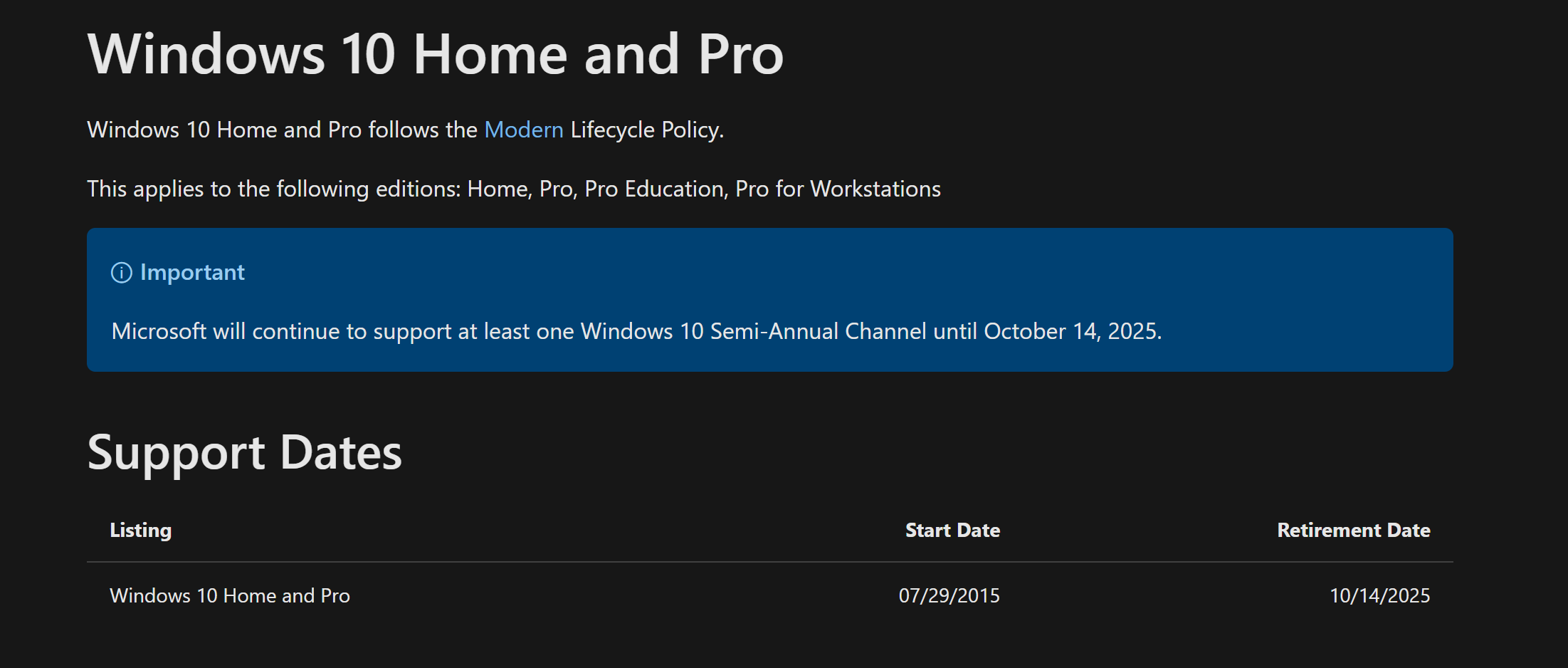Microsoft is planning to kill off Windows 10 in 2025 – does this confirm Windows 11?
So much for ‘the last version of Windows’

Rumors are swirling that Microsoft will announce a new version of Windows, potentially called Windows 11, imminently, and its plans to stop supporting Windows 10 by October 14, 2025 appear to confirm this.
On Microsoft’s Windows 10 Home and Pro Lifecycle Policy page, the company states that it will “continue to support at least one Windows 10 Semi-Annual Channel until October 14, 2025.” Underneath, it then lists the retirement date of “Windows 10 Home and Pro” as “10/14/2025”.
- Windows 11 release date, news, and features
- How to speed up Windows 10
- Amazon Prime Day 2021 sale is nearly here
That looks like pretty clear evidence that Microsoft will kill off Windows 10 in 2025. If the company no longer updates an operating system, it usually means that the operating system is essentially dead, and users will be encouraged to move to a successor.

Does this mean Windows 11 is real?
In recent weeks, Microsoft has been talking about ‘the next generation of Windows’, and the company will be having a special event on June 24 to explain what it means. This has led many to believe that Windows 11 will be revealed, and Microsoft has been fanning the flames of those rumors, with cryptic posts and hints that could hint at Windows 11. The fact that the event starts at 11am ET, for example, has convinced many people that Windows 11 is real.
All this sudden talk of Windows 11 surprised us, as around Windows 10’s launch, Microsoft said that it would be the “last version of Windows”. Since its launch in 2015, Microsoft had stuck to that, releasing major updates to Windows 10, rather than whole new operating systems, like it used to do.
However, now that Microsoft has unveiled that Windows 10 will be retired in 2025, it looks like it won’t be the final version of Windows after all, and that makes Windows 11 (or whatever it will be called) even more likely.
What’s next for Windows 10?
So, what does this mean for Windows 10? Microsoft certainly won’t be dropping it soon, even if Windows 11 releases. For a start, it’ll want to give people time to migrate over to the new operating system, and as we’ve seen with how slow people have been to upgrade from Windows 7, that process can take years.
Get daily insight, inspiration and deals in your inbox
Sign up for breaking news, reviews, opinion, top tech deals, and more.
We should also see a few more major updates for Windows 10 as well. According to the lifecycle page, Windows 10 version 21H1, which just launched, will be supported until December 13, 2022. That obviously means there will be almost three years after that until Windows 10 is retired completely.
We know that Windows 10 21H2, also known as Sun Valley, is coming later this year, and this is set to be a big update for the operating system. That will likely be supported until 2023, so we will see at least one more major Windows 10 update, and maybe even as many as four if Microsoft continues its habit of releasing two big Windows 10 updates every year.
The Windows 10 editions being killed off in 2025 are Home, Pro, Pro Education and Pro for Workstations. Those last two editions could cause trouble, as many businesses and educational institutions rely on them (as well as Pro), and they may not be happy about having to migrate all of their devices to a new operating system.
If they kick up enough of a fuss, it may make Microsoft reconsider its plans – as this has happened in the past.
So, while Microsoft is planning to kill off Windows 10 in 2025, it may not spell the end for the operating system.
- Check out our best laptops 2021 guide
Via Betanews

Matt is TechRadar's Managing Editor for Core Tech, looking after computing and mobile technology. Having written for a number of publications such as PC Plus, PC Format, T3 and Linux Format, there's no aspect of technology that Matt isn't passionate about, especially computing and PC gaming. He’s personally reviewed and used most of the laptops in our best laptops guide - and since joining TechRadar in 2014, he's reviewed over 250 laptops and computing accessories personally.